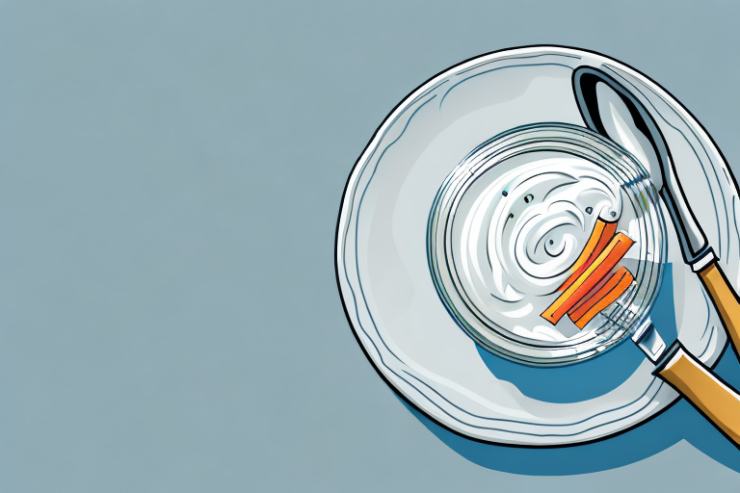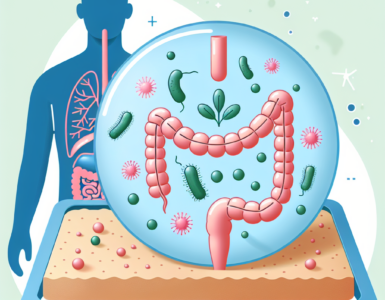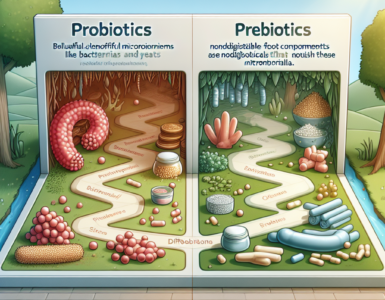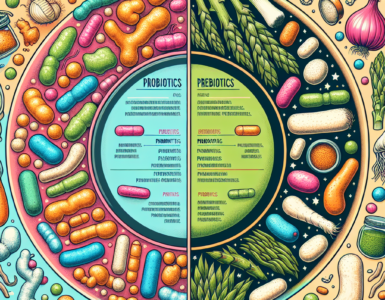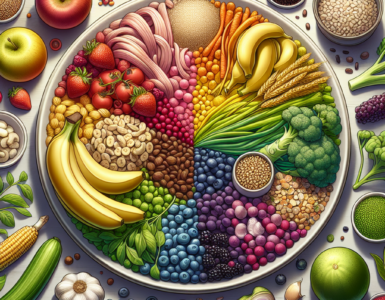If you’re interested in taking care of your gut health, you may have heard of prebiotics and probiotics. These two types of supplements have been gaining popularity in recent years as more and more people become aware of the importance of maintaining a healthy gut microbiome. But what exactly are prebiotics and probiotics, and how do they differ? In this article, we’ll take a deep dive into the world of gut health to help you understand the difference between prebiotics and probiotics, and the role they play in keeping our bodies healthy.
Understanding Prebiotics
Prebiotics are a fascinating topic in the world of nutrition and health. These non-digestible fibers found in various foods have been shown to have numerous health benefits, from improved digestion to a reduced risk of heart disease. In this article, we’ll take a closer look at what prebiotics are, the different types of prebiotics, their health benefits, and the best food sources of prebiotics.
What are Prebiotics?
Prebiotics are a type of dietary fiber that serve as food for the bacteria in our gut. Unlike probiotics, which contain live bacteria, prebiotics promote the growth of beneficial bacteria in our gut, helping to maintain a healthy microbiome. This is important because our gut microbiome plays a crucial role in our overall health and well-being.
Prebiotics can be found in a variety of foods, such as fruits, vegetables, and whole grains. Some of the most common prebiotics include inulin, FOS (Fructooligosaccharides), GOS (Galactooligosaccharides), and XOS (Xylooligosaccharides).
Types of Prebiotics
Let’s take a closer look at the different types of prebiotics:
- Inulin: Inulin is a type of prebiotic fiber that is found in a variety of foods, including bananas, onions, garlic, and asparagus. It is a soluble fiber that is not digested in the small intestine, but instead passes into the colon where it is fermented by the gut bacteria.
- FOS (Fructooligosaccharides): FOS is another type of prebiotic fiber that is found in foods such as bananas, onions, and garlic. It has been shown to have a positive effect on gut health by promoting the growth of beneficial bacteria.
- GOS (Galactooligosaccharides): GOS is a prebiotic fiber that is found in breast milk and dairy products. It has been shown to have a positive effect on gut health, particularly in infants and young children.
- XOS (Xylooligosaccharides): XOS is a prebiotic fiber that is found in foods such as whole grains and bamboo shoots. It has been shown to have a positive effect on gut health by promoting the growth of beneficial bacteria.
Health Benefits of Prebiotics
The consumption of prebiotic fibers has been linked to several health benefits, including:
- Improved digestion: Prebiotics promote the growth of beneficial bacteria in the gut, which can help to improve digestion and reduce symptoms of digestive disorders such as constipation and diarrhea.
- Reduced inflammation: Prebiotics have been shown to have anti-inflammatory properties, which can help to reduce inflammation in the body and lower the risk of chronic diseases such as heart disease and cancer.
- Lowered risk of heart disease: Prebiotics can help to lower cholesterol levels and reduce the risk of heart disease.
- Improved bone density: Prebiotics have been shown to improve calcium absorption, which can help to improve bone density and reduce the risk of osteoporosis.
Prebiotic fibers can also help to boost the immune system by promoting the growth of beneficial bacteria in the gut. This can help to reduce the risk of infections and other illnesses.
Food Sources of Prebiotics
Now that we know the health benefits of prebiotics, let’s take a look at some of the best dietary sources of prebiotics:
- Bananas: Bananas are a great source of prebiotic fiber, particularly inulin and FOS.
- Onions: Onions are rich in prebiotic fibers such as inulin and FOS.
- Garlic: Garlic is another food that is high in prebiotic fibers such as inulin and FOS.
- Asparagus: Asparagus is a great source of prebiotic fiber, particularly inulin.
- Whole grains: Whole grains such as oats, barley, and wheat are rich in prebiotic fibers such as XOS.
It’s important to note that cooking can break down prebiotic fibers, so it’s best to eat these foods raw or lightly cooked to get the full benefit of their prebiotic content.
In conclusion, prebiotics are a type of dietary fiber that promote the growth of beneficial bacteria in our gut. They have numerous health benefits, from improved digestion to a reduced risk of heart disease. By incorporating prebiotic-rich foods into our diet, we can help to maintain a healthy gut microbiome and improve our overall health and well-being.
Understanding Probiotics
Probiotics are a hot topic in the world of health and wellness, and for good reason. These live bacteria have been shown to have numerous benefits for our gut health, immune system, and overall well-being. Let’s dive deeper into what probiotics are, the different types available, their health benefits, and the best food sources to incorporate into your diet.
What are Probiotics?
Probiotics are live bacteria that are found in various foods, such as yogurt and kefir, as well as in supplement form. These bacteria are beneficial to our gut health because they help to restore the balance of good bacteria in our gut, which can become disrupted by factors such as illness, stress, or a poor diet. In fact, our gut is home to trillions of bacteria, both good and bad, which play a crucial role in our digestive and immune health.
Probiotics are different from prebiotics in that they contain live bacteria that can directly supplement the gut microbiome. Prebiotics, on the other hand, are a type of fiber that feeds the good bacteria in our gut, helping them to thrive and multiply.
Types of Probiotics
There are several types of probiotics, but the most common ones are:
- Lactobacillus: This type of probiotic is commonly found in yogurt and other fermented dairy products. It has been shown to help with digestive issues, such as diarrhea, and may also have immune-boosting properties.
- Bifidobacterium: This probiotic is found in the large intestine and helps to break down complex carbohydrates. It has also been shown to help with digestive issues, such as irritable bowel syndrome (IBS).
- Streptococcus: This type of probiotic is commonly found in the mouth and throat, but can also be found in the gut. It has been shown to have immune-boosting properties and may help to reduce inflammation in the body.
These probiotics can be found in a variety of foods, including yogurt, kefir, sauerkraut, kimchi, and miso. However, it’s important to note that not all products containing these foods are created equal. Look for products that contain live and active cultures to ensure that you’re getting the most benefit from your probiotic intake.
Health Benefits of Probiotics
The consumption of probiotics has been linked to several health benefits, including:
- Improved digestion: Probiotics can help to regulate digestion and may be beneficial for those with digestive issues, such as constipation, diarrhea, and IBS.
- Reduced inflammation: Chronic inflammation has been linked to numerous health issues, including heart disease, cancer, and autoimmune disorders. Probiotics may help to reduce inflammation in the body and promote overall health.
- Lowered risk of certain infections: Probiotics can help to boost the immune system by promoting the growth of beneficial bacteria in the gut. This can help to reduce the risk of certain infections, such as urinary tract infections and yeast infections.
- Improved mental health: There is growing evidence to suggest that the gut-brain connection is real, and that the health of our gut can impact our mental health. Probiotics may help to improve symptoms of anxiety and depression, and may also improve cognitive function.
Food Sources of Probiotics
Some of the best dietary sources of probiotics include:
- Yogurt: Look for yogurt that contains live and active cultures, and avoid those that are high in added sugars.
- Kefir: This fermented milk drink is similar to yogurt and contains a variety of probiotics.
- Sauerkraut: This fermented cabbage dish is a good source of probiotics, as long as it is not pasteurized.
- Kimchi: This Korean dish is made from fermented vegetables and is a good source of probiotics.
- Miso: This fermented soybean paste is commonly used in Japanese cuisine and contains a variety of probiotics.
Incorporating these foods into your diet can be a simple and delicious way to support your gut health and overall well-being. Try adding some sauerkraut to your sandwich, or enjoying a bowl of miso soup for lunch. Your gut will thank you!
Key Differences Between Prebiotics and Probiotics
Function in the Gut
The main difference between prebiotics and probiotics is their function in the gut. Prebiotics act as food for the good bacteria in our gut, while probiotics contain live bacteria that directly supplement the gut microbiome. Both prebiotics and probiotics work together to promote a healthy gut microbiome.
Sources and Forms
Prebiotics are found naturally in certain foods, while probiotics can be found in foods or taken in supplement form. It is important to note that not all foods that contain probiotics are created equal, and some probiotics may not survive the digestive process to reach the gut. Supplements can provide a more reliable source of probiotics.
Stability and Shelf Life
Prebiotics are generally more stable and have a longer shelf life than probiotics, as they are not susceptible to the same factors that can cause probiotics to die off or lose effectiveness. It’s important to check the expiration date on any probiotic supplements and to store them properly to ensure their effectiveness.
The Importance of a Balanced Gut Microbiome
How Prebiotics and Probiotics Work Together
Prebiotics and probiotics work together to promote a healthy gut by providing food for and supplementing the good bacteria in our gut. A balanced gut microbiome is important for overall health, as an unhealthy microbiome has been linked to a variety of health problems, including obesity, diabetes, and autoimmune diseases.
The Role of Gut Microbiome in Overall Health
The gut microbiome plays an important role in many aspects of our health, from digestion and nutrient absorption to immune function and mental health. A healthy microbiome is diverse and balanced, with a high number and variety of beneficial bacteria.
Tips for Maintaining a Healthy Gut
To maintain a healthy gut, it’s important to:
- Eat a varied and balanced diet
- Limit intake of processed and sugary foods
- Avoid unnecessary use of antibiotics
- Take probiotic supplements as needed
- Eat prebiotic-rich foods like fruits, vegetables, and whole grains
- Manage stress levels through practices like meditation or yoga
By following these tips, you can help to promote a healthy gut microbiome and improve your overall health.
Conclusion
Prebiotics and probiotics are two types of supplements that can help to promote a healthy gut microbiome. While they differ in their function and form, they both play an important role in maintaining the balance of beneficial bacteria in our gut. To improve your gut health and overall well-being, be sure to eat a varied and balanced diet, limit processed and sugary foods, and consider taking prebiotics and probiotics as needed.
Disclaimer: Any changes to your routine should not be made using the content of this article. Always take care of your health and seek advice from healthcare professionals.
Note: The information provided in this article is for educational purposes only and is not intended to be a substitute for professional medical advice, diagnosis, or treatment. Always seek the advice of your physician or other qualified healthcare provider with any questions you may have regarding a medical condition.


